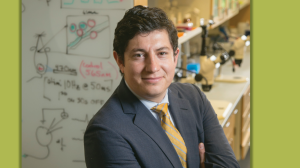A Gut Sense
Diego Bohórquez, PhD, associate professor in medicine, has become known as a “gut-brain neuroscientist.” His team has shown that neuropod cells, a type of sensor cell in the gut, communicate with the brain and help influence decision making about food. This work opens up the possibility of targeting the gut to treat mental health disorders and has been recognized by the U.S. National Academy of Sciences, the office of the Director of the National Institutes of Health (NIH), the New Yorker, and more.
“We always talk about ‘a gut sense,’ and say things like ‘trust your gut.’ Well, there’s something to this,” Bohórquez said.
Just seven years ago, this promising line of work was almost nonexistent. “In the scientific community, this idea was taboo,” Bohórquez said. “If you told somebody that their gut feelings were real, that our decision making could be steered by sensations that are below the threshold of consciousness, very few would actually believe it.”
That all changed because of research conducted with early support from The Hartwell Foundation.
“This idea was going through birth as I went from postdoctoral trainee to becoming a faculty member,” Bohórquez said. Hartwell funding, along with an NIH Career Development Award, gave him the freedom he needed to explore it. “Hartwell, from the very beginning, helped me to explore the possibility that the gut was connected to the brain, and that just like the tongue or the eyes, the gut also has a sense,” he said.
In 2015, when Bohórquez first received Hartwell funding, his team had identified cells called neuropods that connect the gut with the brain. “The Hartwell Foundation really funded us to be able to explore the connections of these sensory cells, the neuropod cells,” he said.
“When ideas are born, it’s hard to visualize their full potential. As you begin to walk the path, you need to make some adjustments accordingly, and having access to some funds gives you that flexibility,” Bohórquez said.
“When ideas are born, it’s hard to visualize their full potential. As you begin to walk the path, you need to make some adjustments accordingly, and having access to some funds gives you that flexibility,”
Diego Bohórquez, PhD
His Hartwell project involved studying gut-brain communication in a mouse model of autism. At the time, he had discovered that neuropods could convert sugar into an electrical impulse that could excite neurons in the gut. Once his team started exploring more, they found that receptors for nutrients in the gut were altered in the mouse models of autism, and they showed that neuropods were essential for recognizing sugars. This basic knowledge helped develop the foundational ideas behind the team’s current work, he said.
Most recently, Bohórquez’s team published a study in Nature Neuroscience showing that neuropods can distinguish sugar from artificial sweeteners, then communicate that information to the brain in milliseconds. This work suggests that food preferences, such as sugar cravings, go deeper than just taste.
The team has also showed that in living mice, it is possible to switch neuropod cells off using a technique called optogenetics, which uses light to control firing of neurons. When neuropod cells were switched off, the animal no longer showed a clear preference for real sugar over artificial sweeteners.
“We can change a mouse’s behavior from the gut,” Bohórquez said. Perhaps in the future, a specific nutrient or microbe could be used to reduce sugar cravings or otherwise steer decision making.
In future work, Bohórquez aims to show how these gut cells recognize other macronutrients. He also sees promise in exploring how information that the gut receives about food in early childhood, when our brains and bodies are more plastic, can shape health for the rest of our lives.
The Bohórquez lab now provides a training ground for scientists in this new area of sensory neurobiology, especially scientists that are interested in using food, microbes, and other compounds to treat mental health disorders from the gut.
“Hartwell believed in the work that we’re doing,” Bohórquez said. “And as a consequence, our program has grown into a robust scientific enterprise.



